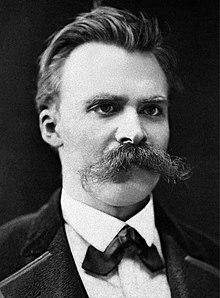"Perspectivism rejects objective metaphysics as impossible, and claims that there are no objective evaluations which transcend cultural formations or subjective designations. This means that there are no objective facts, and that there can be no knowledge of a thing in itself. This separates truth from a particular (or single) vantage point, and means that there are no ethical or epistemological absolutes. This leads to constant reassessment of rules (i.e., those of philosophy, the scientific method, etc.) according to the circumstances of individual perspectives.
“Truth” is thus formalized as a whole that is created by integrating different vantage points together."Nietzsche and I would never be good conversation partners at all. We could really only discuss what truth actually is, because our definitions are so different. What I understand the abstract definition of truth to be is "That which corresponds to that which is as perceived by God." I am one of those darn absolutists...there is "a thing in itself" and truth is not simply a bunch of perspectives on a topic. The perspectives either correspond in actuality to that object, or they don't. If they don't then they are not true.
You can see that Nietzsche and I might stumble over that point. But it might be fun, especially if we both had a bunch of coffee and were really riled up.
And, to be quite frank, I admire his mustache!

Citation:
Photo URL: <http://upload.wikimedia.org/wikipedia/commons/thumb/1/1b/Nietzsche187a.jpg/220px-Nietzsche187a.jpg> Accessed 24 March, 2011.
Quotation: <http://en.wikipedia.org/wiki/Perspectivism> Accessed 24 March, 2011.
1 comment:
Hey Dave--I wonder what you would think then of John Frame's "triperspectivalism" (or "multiperspectivalism"). I've only read some overview papers on it, but it intrigues me to want to read more.
In my simple approach to this topic, I come away with a) truth is objective and real, b) part of what it means to be human is that we can only ever experience this objective truth through limited, incomplete perspectives, and c) that's OK.
Post a Comment